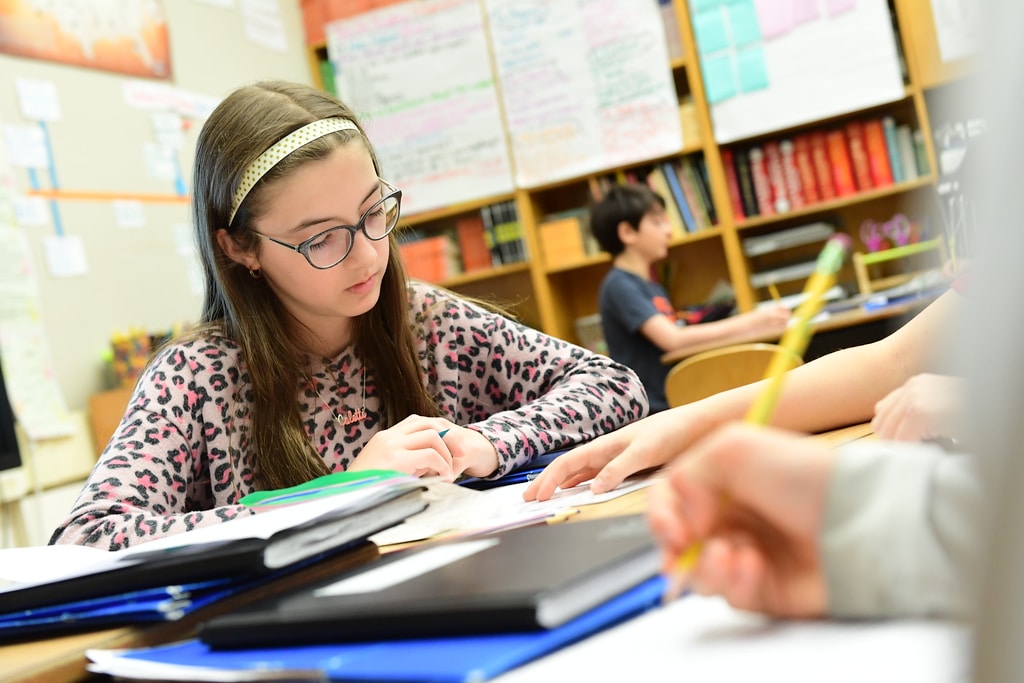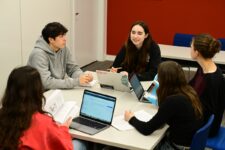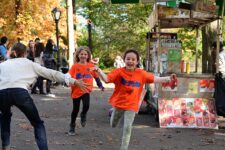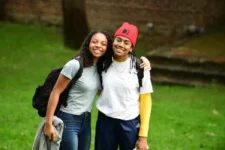At every age, in developmentally appropriate ways, our educational program not only serves our students’ growth as citizens, but strengthens their skills as scholars.
We believe the most valuable learning experience involves reflection, detailed investigation, critical analysis, and contextualized understanding. We believe in growth mindset education practices, and provide our students with opportunities to practice these skills starting from a young age. Projects are designed to offer a learning experience that is challenging and engaging. Students are encouraged to use their imaginations and to look at their subject matter from a range of perspectives. We place ethics at the heart of all that we do, so we know that feeling empathy, offering a balanced and fair argument, and making ethically-informed decisions requires approaching a subject from multiple angles or lenses.
Growth Mindset Education at Fieldston Lower
By approaching a single subject from different angles, our students are able to view their education as holistic and interconnected. In Kindergarten at Fieldston Lower, one such subject is boats. Prior to this unit, our students begin learning about community — the community of their classroom, of New York City, of the animals who live in and around our campuses. In the spring, students learn about the community aboard a ship as well as the importance of boats in building and sustaining New York City. Each student chooses a type of boat to research in depth. They have the opportunity to build their boat in woodshop, write stories about it, draw pictures of themselves on board, then compile their work into a book. In a communal effort, the class works together to build and paint a model port in their classroom, which features the boats they each built, as well as important New York City landmarks. Students then visit a boat such as a marine fireboat or a Coast Guard icebreaker, learning first-hand what each member of the crew does and what role that boat plays in the city. Imagination, critical thinking, challenge, depth — a typical day in the life of a Kindergartner.
Moving up to 1st Grade at Fieldston Lower, our students continue to experience challenging curriculum that is multifaceted and creative. This time their focus is on birds. In the beginning of the year, each student chooses a type of bird to study, like a Harris Hawk or a Tufted Titmouse. Throughout the year, the students learn all about their birds, studying everything from their anatomy to their ecosystem and how it may be affected by climate change. Students write stories about their birds, then bring them to life with clay and paint. The project is beloved within our community; students can often recall information about their bird years later as upperclassmen and even as alumni. The memories are a testament to the power of the educational experience. By learning about something over an extended period of time and from many different angles, our 1st Graders begin to understand abstract connections — a necessary skill for navigating our complex world.
Living and learning in New York City has many wonderful benefits, one being the near-endless opportunities for hands-on, challenging educational experiences. The Hudson River acts as a perfect backdrop for our 3rd Graders at Fieldston Lower to learn about the environment. Students learn about fish and plant life by wading into the water and examining what they catch in their nets. At a nearby lab in Yonkers, students test the pH and salinity of the water. They learn about the Lenape First Peoples and how their lives were intimately connected to the Hudson River. Each student is given time to sit by the river and experience a moment of quiet reflection away from the cacophony of the city, during which time they are encouraged to write poetry and paint with watercolors. Over the course of the year, the students develop their own personal connection to the river; they learn to appreciate its historical, cultural, and ecological importance to New York. When they then learn about the effects of climate change on the river, they are inspired to act — not because they are told to, but because they genuinely want to help preserve the river. Towards the end of the semester, students take part in the Billion Oyster Project, an initiative of the New York Harbor Foundation aimed at restoring one billion live oysters to the harbor to filter pollution and provide a habitat for other species.
Fieldston Upper’s Uniquely Challenging Curriculum
At Fieldston Upper, there are plenty of opportunities for our students to engage with challenging curricula. In “Writing for the Stage and Screen,” 11th and 12th Graders transform short scenes into full-length plays and movie scripts. The students in the course workshop each other’s writing and learn about the value of peer feedback and constructive criticism. Students have the chance to see their work produced in the School’s black box theater — performed and directed by fellow students.
We encourage all of our students to discover and pursue what excites them. For one student, this meant scuba diving into a Pennsylvania quarry to study the growth pattern of zebra mussels. Her work was a part of the Fieldston Science Research Program, a two- to three-year commitment for students who wish to pursue intensive and independent scientific research. The students learn valuable research skills before selecting their topic, which they then spend one to two years pursuing alongside an advisor, often performing actual fieldwork. Our students engage in a learning experience that is demanding and rewarding, leading them towards a more successful and fulfilling future.



